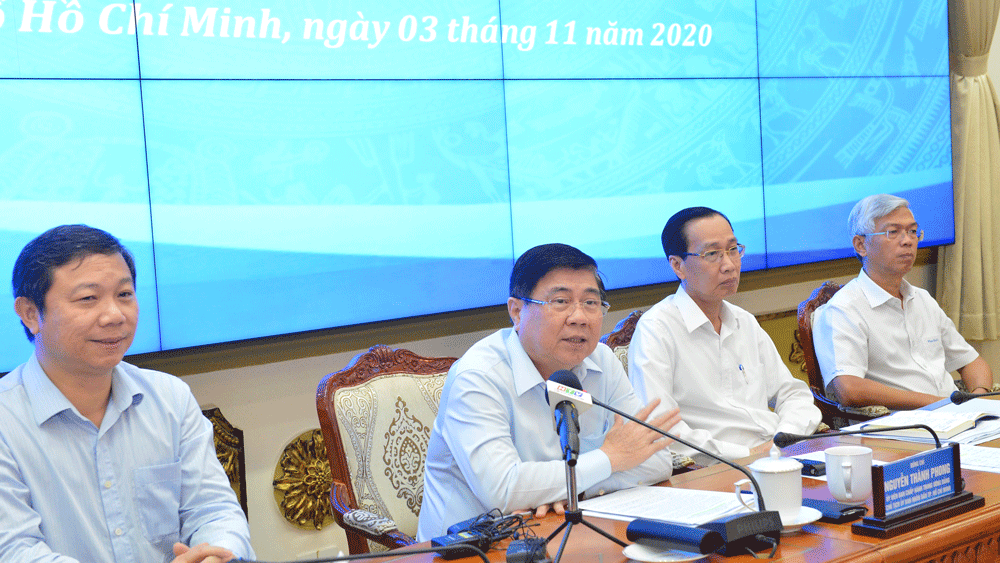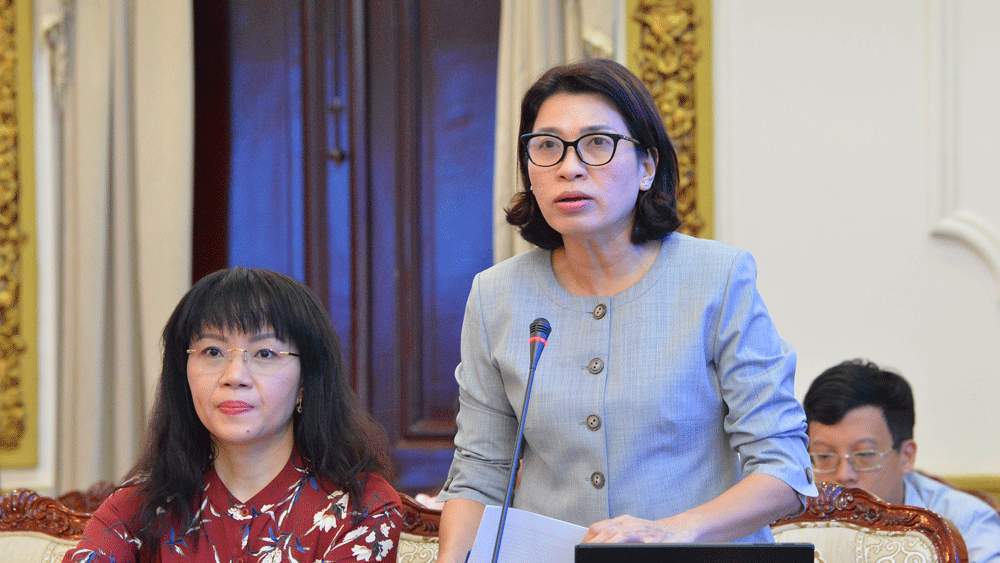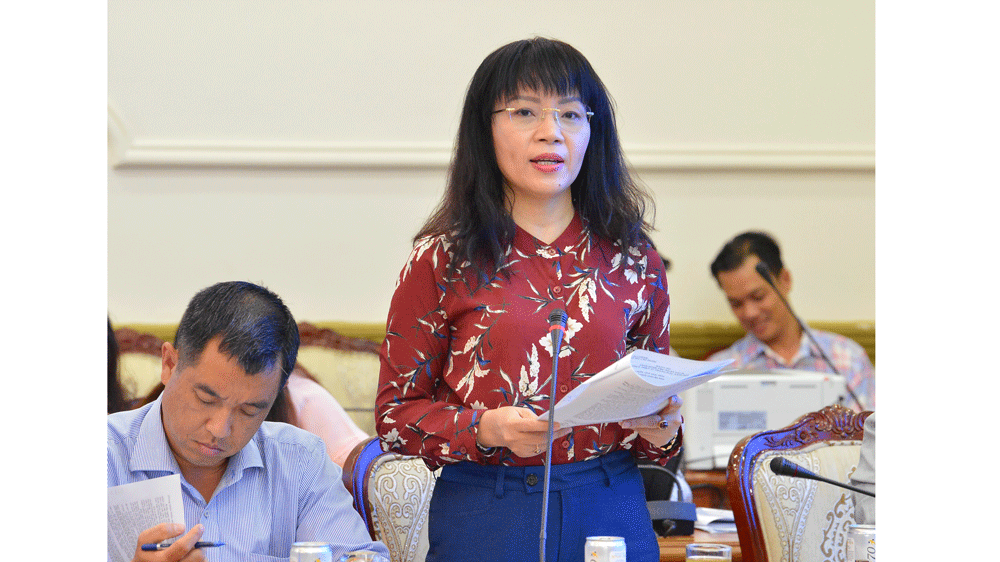
The meeting was co-chaired by Mr. Le Thanh Liem, Standing Vice Chairman of the municipal People's Committee, and vice-chairmen of the municipal People's Committee Mr. Duong Anh Duc and Mr. Vo Van Hoan.
Concluding the meeting, Mr. Nguyen Thanh Phong said that in October, the socio-economic situation of Ho Chi Minh City continued to be affected by the Covid-19 pandemic. Although the impact level was not as heavy as the first wave, it also caused difficulties for the city.
With more than 33,400 newly-established enterprises and more than 7,100 enterprises resuming operations in the first ten months of this year, Mr. Phong said that this has affected positively the city’s economy. It has first solved unemployment.
He emphasized that among the solutions in the Covid-19 support package, the city mentioned measures to prevent the bankruptcy of enterprises. This recovery has proved the vitality of enterprises in the context of the strong impacts of the pandemic.
As the city’s budget revenue in the first ten months of this year merely reached more than VND290.7 trillion, accounting for 71.6 percent of the estimate, Mr. Phong directed that the city will have to work hard to achieve about 85 percent of the assigned budget revenue estimate, which is VND405 trillion. According to Mr. Phong, amid the current situation, the city needs to make great efforts to achieve this figure.
Recognizing free trade agreements with the EU as a great opportunity for the city's economy, Mr. Phong noted that departments need to actively connect enterprises of both sides to promote effective implementation of the agreements.
Disbursement of public investment capital is considered a bright spot of the socio-economic situation in the first ten months of this year. Mr. Phong asked the Department of Planning and Investment to analyze specifically the disbursement results in each unit to learn from experience. In HCMC, investment from the State-owned sector accounts for only 13 percent of the total investment in the city. 70 percent of investment capital belongs to the private sector, and the rest are foreign investment capital. Therefore, besides promoting the disbursement of public investment capital, Mr. Phong especially emphasized the improvement of the investment environment, focusing on removing difficulties of enterprises to develop production and business. Thereby, the city can attract investment resources from people and foreign investors.
Mr. Phong ordered that industries and localities must immediately have socio-economic plans for their industries and localities because 2021 is the year of implementing the Resolution of the 11th Congress of HCMC Party Organization and the five-year plan for the period from 2021 to 2026.
At the same time, the Department of Planning and Investment must coordinate with other sectors to reevaluate the implementation of the Resolution of the Ho Chi Minh City People's Council on the support package for enterprises and employees affected by the Covid-19 pandemic. Along with that, it must evaluate what the results of the city’s economic recovery program have achieved and how the upcoming directions are.
He also directed the Department of Home Affairs to coordinate with the Office of the municipal People's Committee to organize a conference to analyze and dissect the reasons why the public administrative reform indicators are not satisfactory and find more drastic solutions in the coming time.
The Department of Planning and Investment is entrusted to advise on some of the contents of the stimulus programs in some fields, such as digital transformation and logistics.
Concluding the meeting, Mr. Nguyen Thanh Phong said that in October, the socio-economic situation of Ho Chi Minh City continued to be affected by the Covid-19 pandemic. Although the impact level was not as heavy as the first wave, it also caused difficulties for the city.
With more than 33,400 newly-established enterprises and more than 7,100 enterprises resuming operations in the first ten months of this year, Mr. Phong said that this has affected positively the city’s economy. It has first solved unemployment.
He emphasized that among the solutions in the Covid-19 support package, the city mentioned measures to prevent the bankruptcy of enterprises. This recovery has proved the vitality of enterprises in the context of the strong impacts of the pandemic.
As the city’s budget revenue in the first ten months of this year merely reached more than VND290.7 trillion, accounting for 71.6 percent of the estimate, Mr. Phong directed that the city will have to work hard to achieve about 85 percent of the assigned budget revenue estimate, which is VND405 trillion. According to Mr. Phong, amid the current situation, the city needs to make great efforts to achieve this figure.
Recognizing free trade agreements with the EU as a great opportunity for the city's economy, Mr. Phong noted that departments need to actively connect enterprises of both sides to promote effective implementation of the agreements.
Disbursement of public investment capital is considered a bright spot of the socio-economic situation in the first ten months of this year. Mr. Phong asked the Department of Planning and Investment to analyze specifically the disbursement results in each unit to learn from experience. In HCMC, investment from the State-owned sector accounts for only 13 percent of the total investment in the city. 70 percent of investment capital belongs to the private sector, and the rest are foreign investment capital. Therefore, besides promoting the disbursement of public investment capital, Mr. Phong especially emphasized the improvement of the investment environment, focusing on removing difficulties of enterprises to develop production and business. Thereby, the city can attract investment resources from people and foreign investors.
Mr. Phong ordered that industries and localities must immediately have socio-economic plans for their industries and localities because 2021 is the year of implementing the Resolution of the 11th Congress of HCMC Party Organization and the five-year plan for the period from 2021 to 2026.
At the same time, the Department of Planning and Investment must coordinate with other sectors to reevaluate the implementation of the Resolution of the Ho Chi Minh City People's Council on the support package for enterprises and employees affected by the Covid-19 pandemic. Along with that, it must evaluate what the results of the city’s economic recovery program have achieved and how the upcoming directions are.
He also directed the Department of Home Affairs to coordinate with the Office of the municipal People's Committee to organize a conference to analyze and dissect the reasons why the public administrative reform indicators are not satisfactory and find more drastic solutions in the coming time.
The Department of Planning and Investment is entrusted to advise on some of the contents of the stimulus programs in some fields, such as digital transformation and logistics.
 Ms. Le Thi Huynh Mai, Director of the Department of Planning and Investment of HCMC, speaks at the meeting. (Photo: SGGP)
Ms. Le Thi Huynh Mai, Director of the Department of Planning and Investment of HCMC, speaks at the meeting. (Photo: SGGP)
Earlier, reporting at the meeting, Ms. Le Thi Huynh Mai, Director of the Department of Planning and Investment of HCMC, said that in 2020, the economic situations of the world, the region, and the country have faced many difficulties, the unpredictable complicated Covid-19 pandemic has profoundly affected all aspects of the life and social economy of the city. In the first ten months of this year, the total retail sales of goods and service revenue decreased by 2.1 percent over the same period; accommodation and catering services dropped by 37.5 percent; tourism fell by 74.3 percent. The total number of international visitors to the city is estimated at 1.3 million, down 81 percent over the same period. The index of industrial production is estimated to slide 4.74 percent over the same period. The production value of agriculture, forestry, and fishery is estimated at more than VND10.4 trillion, up 2.62 percent over the same period. At the Department of Planning and Investment, more than 4,600 enterprises have completed dissolution procedures, up 15.5 percent over the same period and more than 12,000 enterprises have temporarily suspended their operations. The total State budget revenue is estimated at more than VND290.7 trillion, accounting for 71.65 percent of the estimate, a decrease of 12.83 percent over the same period. However, the socio-economic situation of the city in the first ten months of the year still has bright spots. Total retail sales of goods and service revenue show signs of recovery, edging up 3 percent from the previous month. The main reason is because of the diversification of payment methods and transactions, and the effectiveness of consumer demand stimulus events. The total import-export turnover reached $77.65 billion, up 1.5 percent compared to the same period. Of which, export turnover reached $36.71 billion, up 5.5 percent over the same period. The production value of high-tech products of the Saigon Hi-Tech Park in the first ten months of this year is estimated at $16.2 billion, an increase of 19.82 percent over the same period. Total capital mobilization of HCMC-based credit institutions is estimated at more than VND2.7 quadrillion by the end of October, up 6.5 percent over the same period. Public investment disbursement by October 31 exceeded VND24.3 trillion, accounting for 57.9 percent of the total capital plan of the city. If including the completed volume but not carrying out disbursement procedures at the State Treasury, public investment disbursement reaches 64.2 percent compared to the assigned capital plan. As for business establishment, in the first ten months of this year, the city has had more than 33,400 newly-established enterprises. Although this figure is lower than that in the same period, the registered capital is 41.6 percent higher than that in the same period last year. In ten months, more than 7,100 enterprises have resumed operations. Foreign direct investment attraction touched $3.4 billion.
 Ms. Pham Thi Hong Ha, Director of the Department of Finance of HCMC, speaks at the meeting. (Photo: SGGP)
Ms. Pham Thi Hong Ha, Director of the Department of Finance of HCMC, speaks at the meeting. (Photo: SGGP)
Regarding the results of State budget revenue in October, Ms. Pham Thi Hong Ha, Director of the Department of Finance of HCMC, said that the budget revenue had made a positive change, increasing by 27 percent compared to September. Local budget revenue in the first ten months of this year is estimated at more than VND290.78 trillion, accounting for 71.65 percent of the estimate, equal to 87.17 percent of that in the same period.
The average revenue per working day in the first ten months of this year was nearly VND1.4 trillion, equal to 85.43 percent of the average level that the city has to collect in 2020, and 85.5 percent of the average level of the same period last year.
So far, local budget revenue has surpassed VND60.69 trillion, equal to 66.29 percent of the estimate and 87.68 percent of that in the same period.
Under the impacts of the Covid-19 pandemic, with the inherent dynamism, the city-based business community has promptly adjusted its economic model, shifting to e-commerce business models. Imports of goods showed positive signs, and groups of materials and raw materials for production had good growth over the same period.
The State budget revenues in the city in the third quarter and the beginning of the fourth quarter of this year have posted positive growth. Most of the budget revenue targets exceeded 70 percent compared to the estimate. It is expected that the budget revenue in the city to the end of this year will be VND355.81 trillion, accounting for 87.7 percent of the estimate, equal to 86.73 percent of that in the same period.
Total local budget expenditure is estimated at VND56.79 trillion, accounting for 55.66 percent of the estimate. In which, spending for investment and development is VND20.16 trillion, reaching 55.84 percent of the estimate assigned by City People's Council, an increase of 49.11 percent over the same period; recurrent expenditure is VND30.47 trillion, accounting for 65.32 percent of the estimate, up 6.51 percent over the same period.
To ensure correct and sufficient revenue for the State budget, according to Ms. Pham Thi Hong Ha, besides solutions to create favorable conditions for businesses, the city will also fight against revenue loss, limit tax arrears, and promote the exploitation of revenues from land to create a stable source of revenue for the city budget in the last months of this year and the following years.
The average revenue per working day in the first ten months of this year was nearly VND1.4 trillion, equal to 85.43 percent of the average level that the city has to collect in 2020, and 85.5 percent of the average level of the same period last year.
So far, local budget revenue has surpassed VND60.69 trillion, equal to 66.29 percent of the estimate and 87.68 percent of that in the same period.
Under the impacts of the Covid-19 pandemic, with the inherent dynamism, the city-based business community has promptly adjusted its economic model, shifting to e-commerce business models. Imports of goods showed positive signs, and groups of materials and raw materials for production had good growth over the same period.
The State budget revenues in the city in the third quarter and the beginning of the fourth quarter of this year have posted positive growth. Most of the budget revenue targets exceeded 70 percent compared to the estimate. It is expected that the budget revenue in the city to the end of this year will be VND355.81 trillion, accounting for 87.7 percent of the estimate, equal to 86.73 percent of that in the same period.
Total local budget expenditure is estimated at VND56.79 trillion, accounting for 55.66 percent of the estimate. In which, spending for investment and development is VND20.16 trillion, reaching 55.84 percent of the estimate assigned by City People's Council, an increase of 49.11 percent over the same period; recurrent expenditure is VND30.47 trillion, accounting for 65.32 percent of the estimate, up 6.51 percent over the same period.
To ensure correct and sufficient revenue for the State budget, according to Ms. Pham Thi Hong Ha, besides solutions to create favorable conditions for businesses, the city will also fight against revenue loss, limit tax arrears, and promote the exploitation of revenues from land to create a stable source of revenue for the city budget in the last months of this year and the following years.
























